
Madagascar: Army unit joins protesters as anti-Rajoelina unrest escalates in Antananarivo
Tensions in Madagascar’s capital, Antananarivo, have reached a dangerous peak after a faction of the army joined anti-government demonstrators demanding the resignation of President Andry Rajoelina.
The unrest, which began in late September over widespread water and electricity shortages, has now spiralled into a full-blown political crisis. On Saturday, October 11, soldiers from the CAPSAT — the Army Personnel and Services Administration Corps — announced their defection, declaring their support for the protesters.
In a message circulated earlier in the day, the unit urged fellow security forces to reject any orders to use violence against civilians. “Refuse orders to shoot civilians and protect the people,” the soldiers said, warning against being used to suppress fellow citizens.
Hours later, several military vehicles were seen entering central Antananarivo, where large crowds had gathered around Lake Anosy and Place du 13-Mai — a historic site synonymous with Madagascar’s past uprisings dating back to the 1970s.
“Let us join forces, soldiers, gendarmes, and police, and refuse to be paid to shoot our brothers and sisters,” the mutineers declared in a video that quickly spread across social media platforms.
Witnesses reported sporadic gunfire in parts of the capital, though sources suggested that resistance to the mutiny appeared minimal. The atmosphere in Antananarivo was described as tense but defiant, with demonstrators chanting slogans calling for the president’s departure.
The growing military defection marks a serious escalation in a crisis that has already paralysed daily life in the city. Analysts warn that the split within the armed forces could further destabilise Madagascar’s fragile political balance, echoing the turbulence that has defined much of the country’s modern history.
President Rajoelina, who came to power after a 2009 coup before returning to office through elections, has not yet publicly addressed the latest developments. However, pressure is mounting on his administration as protests spread and sections of the security apparatus appear to turn against him.
As night fell over Antananarivo, uncertainty hung heavy in the air — with fears that the country could be edging toward another period of political upheaval.



